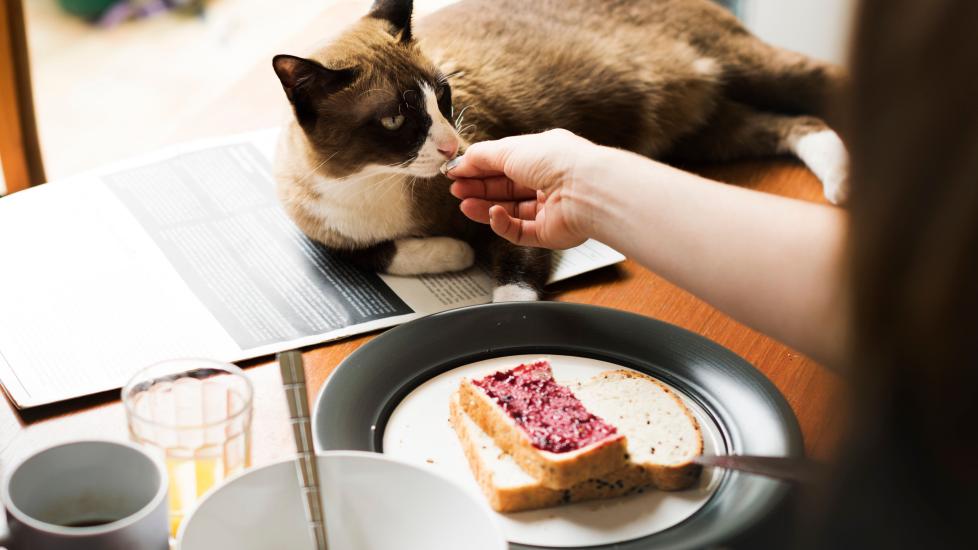Can Cats Eat Bread?
We’ve all seen Internet videos of cats snatching entire loaves of bread off the counter, and you might have a bread bandit yourself. But can cats eat bread safely? Like with many other “human” foods, the answer isn’t a straightforward “yes” or “no.”
Is Bread Bad for Cats?
There’s nothing toxic or dangerous about cats eating a cooked slice of sandwich bread. But there’s nothing beneficial about cats eating bread, either.
Cats are “obligate carnivores,” meaning that they need to obtain most of their nutrients from meats and meat products. Bread, for cats, is essentially empty calories because there is no meat protein present. Bread also contains a lot of carbohydrates, which are unhealthy for cats. In fact, if your cat is on a restricted carbohydrate diet (like if your cat has diabetes), you should avoid feeding him any bread at all.
As a general rule, the “plainer” the bread is, the more likely it will be safe for your cat. Additives that include sugar, spices, onions, or garlic make the bread a food to avoid—and may even make it toxic.
Banana Bread
It’s not a good idea to share banana bread with your cat. Banana bread contains sugar and a number of added spices, which will both decrease the nutritional benefit of the bread and increase the risk of toxicity.
This is especially true if the loaf was made “sugar-free,” as it may contain xylitol, which is highly toxic to cats. If your cat eats any bread containing xylitol, call your veterinarian immediately.
Garlic Bread
Sorry, Kitty, but garlic bread goes immediately on the “no-go” list. Garlic is toxic to cats, especially in large quantities. Many cats love to lick the garlic butter off the bread, but even this may be enough to make them sick.
Keep the garlic bread away from your kitties, and if you think they’ve eaten any, it’s best to give a call to your veterinarian.
White Bread
White bread, although considered boring by some humans, is probably one of the safer breads to share with your cat. Although it’s still loaded with carbs, white bread doesn’t have other ingredients that are likely to make your cat sick. Some people with loaf-loving cats even manage to hide medications in a small piece of white bread.
Wheat Bread
Wheat bread is another bread you can likely share with your cat on occasion, as most brands do not contain extra additives that might be harmful for felines. But keep in mind that all breads are high in carbs and considered empty calories, so only share small amounts—and only on occasion.
Pumpkin Bread
Pumpkin bread is generally loaded with all kinds of sugar and spices. Although plain pumpkin alone is not harmful to cats, some of the ingredients that show up in pumpkin bread are more likely to be harmful and possibly even toxic.
Hawaiian Bread
Hawaiian bread is a sweeter form of bread with extra sugar or fruit added to it. This may certainly make it more likely that kitty develops an upset stomach from eating it, so it’s best avoided.
Corn Bread
Corn and corn meal are not toxic to cats, and as such, corn bread falls in the category of a “safe” bread to feed. However, it’s very high in calories as well as in carbohydrates, meaning that it’s a treat best avoided, although a small bite of corn bread is unlikely to cause any harm to kitty.
Keep in mind that all breads are high in carbs and considered empty calories, so only share small amounts—and only on occasion.
Can Cats Eat Bread Dough?
Uncooked bread dough is perhaps the most dangerous form of bread for cats. Uncooked yeast dough can lead to a number of different problems. When the dough lands in a cat’s stomach, it will expand, just like it does on the counter. This leads to painful abdominal bloating, which might require surgery to resolve.
On top of this, yeast releases alcohol as it ferments, which can lead to alcohol poisoning. Even a small amount of yeast-containing dough can result in:
In serious cases, eating dough could even prove fatal. If your cat has even eaten a small amount of yeast-containing dough (of any type—not just bread dough), seek emergency care right away.
Why Do Some Cats Like Bread?
There are cats that just can’t wait for a snack of bread, while others show no interest in it whatsoever. We don’t know for certain why some cats like bread, but it could be because of the smell or the texture—or maybe your cat just loves carbs.
Just remember that if you do have a cat that loves bread, only provide a very small amount (about the size of a thumbnail) only once or twice a week. Any more will provide too many empty calories and carbs to your kitty, which is unhealthy.
My Cat Ate Bread. What Do I Do?
If your cat has eaten a small amount of white or wheat bread, there’s likely nothing to be concerned about—unless he’s on a carbohydrate-restricted diet like we often see with cats with pancreatitis or diabetes. But a healthy cat might really enjoy a small amount of stolen snack with minimal aftereffects.
If your kitty has eaten garlic bread or bread containing sugars or spices, call your veterinarian for advice. If the dough was uncooked or the bread contained xylitol, this is considered an emergency and you must seek immediate care.
But even if your kitty ate some “permitted” breads, not all cats can tolerate all foods. Watch your cat closely for signs of gastrointestinal upset, including vomiting, diarrhea, and discomfort. If these do develop, call your veterinarian. But rest easy; most cats can enjoy an occasional snack of plain, cooked bread without any significant consequences.
Featured Image: Adobe/Rawpixel.com
